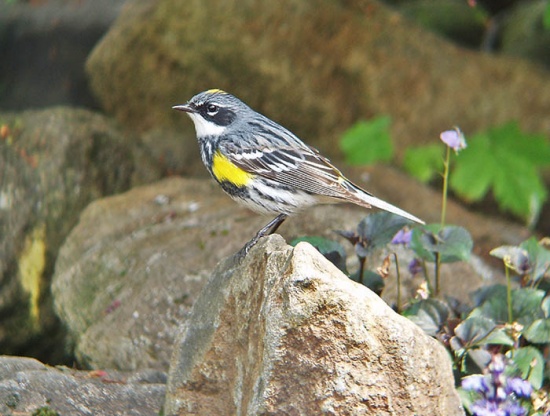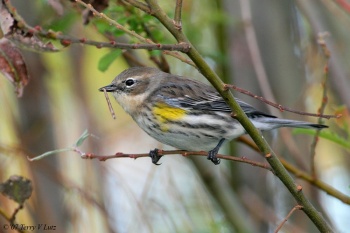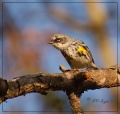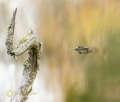(id, ref) |
(Clearer Audobon's image. Image captions) |
||
| Line 1: | Line 1: | ||
| − | [[Image:Yellow-rumped_Warbler.jpg|thumb|550px|right|Photo by {{user|Forcreeks|Forcreeks}}<br />Sellwood, [[Oregon]], [[USA]], April 2005]] | + | [[Image:Yellow-rumped_Warbler.jpg|thumb|550px|right|Adult male, breeding plumage, Myrtle Warbler<br />Photo by {{user|Forcreeks|Forcreeks}}<br />Sellwood, [[Oregon]], [[USA]], April 2005]] |
;[[:Category:Setophaga|Setophaga]] coronata | ;[[:Category:Setophaga|Setophaga]] coronata | ||
'''Includes: Myrtle Warbler; Audubon's Warbler; West Mexico Warbler; Goldman's Warbler''' | '''Includes: Myrtle Warbler; Audubon's Warbler; West Mexico Warbler; Goldman's Warbler''' | ||
==Identification== | ==Identification== | ||
| + | [[Image:AudbnsWarbler.jpg|thumb|350px|right|Adult male, breeding plumage, Audubon's subspecies<br />Photo by {{user|ryanibis|ryanibis}}<br /> Whetstone, [[Arizona]], March 2018]] | ||
14–15 cm (5½-6 in)<br /> | 14–15 cm (5½-6 in)<br /> | ||
| − | Yellow patches on rump and sides unique but those on the sides occasionally lacking. | + | Yellow patches on rump and sides unique but those on the sides occasionally lacking. |
| + | |||
Females are more brownish and in the Audubon's form may have whitish or buff throat. <br /> | Females are more brownish and in the Audubon's form may have whitish or buff throat. <br /> | ||
Outside of breeding plumage, both sexes become duller but usually still show yellow rump and side patches. | Outside of breeding plumage, both sexes become duller but usually still show yellow rump and side patches. | ||
| − | [[Image: | + | ====Variations==== |
| + | [[Image:Yellow-rumped_Warbler_autumn.jpg|thumb|350px|right|Winter plumage, Myrtle Warbler<br />Photo by {{user|etow|etow}}<br />North-central [[Ohio]], [[USA]], October 2007]] | ||
| + | Birds of subspecies ''nigrifrons'' (West Mexico Warbler) are large and have dark mantle, while Goldman's Warbler (''goldmani'') are large and have black mantle. | ||
| + | |||
| + | Breeding males of the Myrtle form and the form sometimes called Audubon's Warbler both have grey mantle with black stripes. | ||
| + | |||
| + | The Myrtle form has white throat and black on side of head mostly surrounded by white below the grey crown, while Audubon's have yellow throat, reduced white markings and less contrast between ear-[[Topography#General Anatomy|coverts]] and crown.<br /> | ||
| + | Both forms have white wing bars but more extensive white feather edges in the Audubon's form. The Audubon's form become blacker in the southern parts of its range. <br /> | ||
| + | |||
==Distribution== | ==Distribution== | ||
| + | [[Image:Yellow-rumped_Warbler_Cuchumatanes_Apr_06_(1)_by_Tom_Jenner.jpg|thumb|350px|right|Adult male, breeding plumage, subspecies ''goldmani''<br />Photo by {{user|Tom+Jenner|Tom Jenner}}.<br />Cordillera de los Cuchumatanes in western [[Guatemala]], April 2006.]] | ||
North America's most common warbler. Breeds from [[Alaska]] east to northern [[Quebec]] (absent only in arctic region) south across most of the western [[United States]]; northern [[Minnesota]] and [[Michigan]]; [[New York]]; western [[Pennsylvania]], and New England; also along the Appalachians south to [[West Virginia]]. | North America's most common warbler. Breeds from [[Alaska]] east to northern [[Quebec]] (absent only in arctic region) south across most of the western [[United States]]; northern [[Minnesota]] and [[Michigan]]; [[New York]]; western [[Pennsylvania]], and New England; also along the Appalachians south to [[West Virginia]]. | ||
| Line 15: | Line 26: | ||
Casual vagrant to [[Great Britain]] (22 records). | Casual vagrant to [[Great Britain]] (22 records). | ||
==Taxonomy== | ==Taxonomy== | ||
| − | |||
Formerly placed in genus [[:Category:Dendroica|Dendroica]]. | Formerly placed in genus [[:Category:Dendroica|Dendroica]]. | ||
====Subspecies==== | ====Subspecies==== | ||
| Line 26: | Line 36: | ||
::*breeds from south-eastern [[British Columbia]] south (east of the Cascades and Sierra Nevada) to [[Arizona]], [[New Mexico]] and western [[Texas]] (this form sometimes lumped with ''auduboni'') | ::*breeds from south-eastern [[British Columbia]] south (east of the Cascades and Sierra Nevada) to [[Arizona]], [[New Mexico]] and western [[Texas]] (this form sometimes lumped with ''auduboni'') | ||
*Group "Myrtle Warbler" | *Group "Myrtle Warbler" | ||
| − | |||
:*''S. c. coronata'': | :*''S. c. coronata'': | ||
::*breeds from north-central [[Alberta]] across [[Canada]] to the eastern [[United States]] | ::*breeds from north-central [[Alberta]] across [[Canada]] to the eastern [[United States]] | ||
| Line 45: | Line 54: | ||
Click on photo for larger image | Click on photo for larger image | ||
<gallery> | <gallery> | ||
| − | Image:040616YRWarbler1a-copy.jpg|Moulting to Spring plumage<br />Photo by {{user|KC+Foggin|KC Foggin}}<br />Myrtle Beach, [[South Carolina]], April 2016 | + | Image:040616YRWarbler1a-copy.jpg|Moulting to Spring plumage, Myrtle Warbler<br />Photo by {{user|KC+Foggin|KC Foggin}}<br />Myrtle Beach, [[South Carolina]], April 2016 |
| − | Image:Yellow-rumped Warbler 82 3574.jpg|Photo by {{user|STEFFRO1|STEFFRO1}}<br />[[Huntington Beach State Park]], [[South Carolina]], January 2015 | + | Image:Yellow-rumped Warbler 82 3574.jpg|Winter plumage, Myrtle Warbler<br />Photo by {{user|STEFFRO1|STEFFRO1}}<br />[[Huntington Beach State Park]], [[South Carolina]], January 2015 |
</gallery> | </gallery> | ||
==Reference== | ==Reference== | ||
Revision as of 21:53, 21 May 2018
- Setophaga coronata
Includes: Myrtle Warbler; Audubon's Warbler; West Mexico Warbler; Goldman's Warbler
Identification
14–15 cm (5½-6 in)
Yellow patches on rump and sides unique but those on the sides occasionally lacking.
Females are more brownish and in the Audubon's form may have whitish or buff throat.
Outside of breeding plumage, both sexes become duller but usually still show yellow rump and side patches.
Variations
Birds of subspecies nigrifrons (West Mexico Warbler) are large and have dark mantle, while Goldman's Warbler (goldmani) are large and have black mantle.
Breeding males of the Myrtle form and the form sometimes called Audubon's Warbler both have grey mantle with black stripes.
The Myrtle form has white throat and black on side of head mostly surrounded by white below the grey crown, while Audubon's have yellow throat, reduced white markings and less contrast between ear-coverts and crown.
Both forms have white wing bars but more extensive white feather edges in the Audubon's form. The Audubon's form become blacker in the southern parts of its range.
Distribution
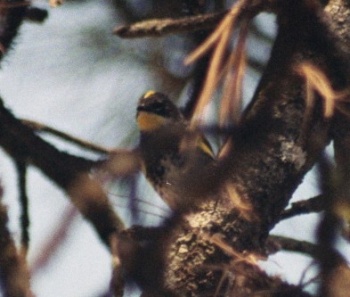
Photo by Tom Jenner.
Cordillera de los Cuchumatanes in western Guatemala, April 2006.
North America's most common warbler. Breeds from Alaska east to northern Quebec (absent only in arctic region) south across most of the western United States; northern Minnesota and Michigan; New York; western Pennsylvania, and New England; also along the Appalachians south to West Virginia.
Found anywhere in North America in migration. Winters in southern United States, along the west coast north to Washington, and in Central America. Rare in northern South America.
Casual vagrant to Great Britain (22 records).
Taxonomy
Formerly placed in genus Dendroica.
Subspecies
There are 6 subspecies1
The eastern (Myrtle) and western (Audubon's) races of this species were once considered separate species. New results indicate that this topic probably will be assessed again soon, and if so, each of the four groups may become full species.
- Group "Audubon's Warbler"
- S. c. auduboni:
- breeds along the Pacific Slope region
- S. c. memorabilis:
- breeds from south-eastern British Columbia south (east of the Cascades and Sierra Nevada) to Arizona, New Mexico and western Texas (this form sometimes lumped with auduboni)
- Group "Myrtle Warbler"
- S. c. coronata:
- breeds from north-central Alberta across Canada to the eastern United States
- S. c. hooveri:
- breeds from Alaska, northern Yukon, and north-western Mackenzie south to northern British Columbia (this form sometimes lumped with coronata)
- Group "West Mexico Warbler" (or sometimes called "Black-fronted Warbler")
- S. c. nigrifrons:
- breeds Chihuahua and Durango mountains in western Mexico.
- Group "Goldman's Warbler"
- S. c. goldmani:
- breeds south-eastern Chiapas (rare) and Guatemala
Habitat
Coniferous and mixed forests also winters in open area.
Behaviour
Diet
Diet mostly insectivorous but will eat berries and other vegetation. Audobon's group eat some fruit in the winter months.
Gallery
Click on photo for larger image
Moulting to Spring plumage, Myrtle Warbler
Photo by KC Foggin
Myrtle Beach, South Carolina, April 2016Winter plumage, Myrtle Warbler
Photo by STEFFRO1
Huntington Beach State Park, South Carolina, January 2015
Reference
- Dunn, Jon; Garrett, Kimball. 1997. A Field Guide to Warblers of North America. Boston: Houghton Mifflin Company. ISBN 9780395783214
- Clements, J. F., T. S. Schulenberg, M. J. Iliff, D. Roberson, T. A. Fredericks, B. L. Sullivan, and C. L. Wood. 2016. The eBird/Clements checklist of birds of the world: v2016, with updates to August 2016. Downloaded from http://www.birds.cornell.edu/clementschecklist/download/
- Birdforum thread discussing the taxonomy of Yellow-rumped Warbler
- Birds of North America read April 2018
Recommended Citation
- BirdForum Opus contributors. (2024) Yellow-rumped Warbler. In: BirdForum, the forum for wild birds and birding. Retrieved 5 May 2024 from https://www.birdforum.net/opus/Yellow-rumped_Warbler
External Links




